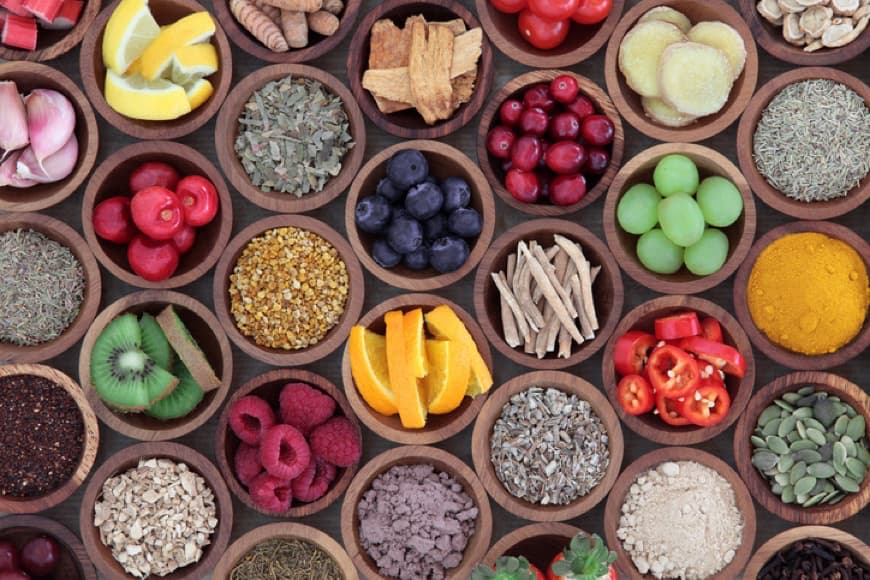SPRING HEALTH NEWSLETTER
Spring is officially here after a long winter, and with that comes beautiful weather, new beginnings and of course a newsletter from our clinic to you! We hope that the information provided will be of use to you and your loved ones and if you have any inquiries please feel free to give us a call at the clinic. Enjoy!

In this newsletter:
- COVID – 19 Update & Naturopathic Services
- Spring Cleaning: Decluttering the Mind
- Collagen: should you or should you not?
- Why is my stomach bloated?
- 10 Spring Superfoods
COVID-19 UPDATE AND NATUROPATHIC SERVICES

The primary priority at the Nature’s Intentions Naturopathic Clinic is the health, welfare and safety of its patients, therapists and staff.
At this time, the Public Health Agency of Canada has assessed the public health risk associated with COVID-19 as high for the general population in Canada. As health care professionals, we are closely monitoring the COVID-I9 situation and are staying current on updates from the Ontario Ministry of Health.
We are respectful of the directives that have been given by public health officials and want to maintain the high-quality treatment you expect from us within a safe environment.
In order to ensure continuous care for our patients, at the present time until there are no further concerns with the spread of COVID-19, all of our in-person appointments and courses have been switched to telephone or skype calls. However, all the physical therapy appointments – including massage, acupuncture and Reiki Treatments, along with physical exams have been cancelled until further notice. We understand the disappointment and frustration regarding the cancellations, however, these temporary changes must be made in order to protect the health and well-being of those around us, including yourself and your loved ones. Please call or email us at 416 913 4325 or email at [email protected] to reschedule your appointment at your earliest convenience.
We will retain these protocols until we are sure that there is no further concern of the spread of Covid-19. If you are running low on your supplements and need us to send out any of your supplements, please call the clinic and we will gladly ship them out to you.
The Ontario Ministry of Health recommends the following:
There are everyday actions that can help prevent the spread of germs that cause respiratory illnesses. Take these everyday steps to reduce exposure to the virus and protect your health:
- Wash your hands often with soap and water or alcohol-based hand sanitizer
- Sneeze and cough into your sleeve
- Avoid touching your face
- Avoid contact with people who are sick
- Stay home
In addition to the recommendations made by the Government listed below, we recommend:
- Increasing personal hygiene by washing hands and arms regularly for a minimum of 20 seconds with soap and hot water
- Reducing your consumption of processed foods and sugars
- Staying hydrated
- Providing additional immune support through botanicals, vitamins and minerals such as Vitamin D, Vitamin C and Zinc to help the body through this stressful time
SPRING CLEANING - DECLUTTERING THE MIND

Spring is officially here and many of you are probably already considering the traditional spring-cleaning practices on top of the all the COVID - 19 sanitizing practices. Spring cleaning is the act of tidying up the home, whether it's taking down the long overdue Christmas decorations and cleaning out the fridge or doing a total scrub down of the entire house. While most people sense that clutter is unhealthy, perhaps we are forgetting an important space that also requires cleansing. It is time to start a new tradition: spring cleaning of the mind, body and emotional state. It's time to revive and keep working on those New Year's Resolutions we may have left, forgotten and buried under the pile of snow this past winter, but even more so, time to declutter our beings.
So, what does this entail you may ask?
It's fairly simple, there are many steps we can take starting this spring in order to find a happy balance for our bodies to function well naturally and keep our minds sharp.
As we are crawling out of hibernation, so to speak, you may find that the winter might have taken a toll on us. During the cold season we often find ourselves locked up in the comfort of our homes which leads to a lack of physical activity and a lack of motivation. Combine that with holiday treats and it leaves us feeling worn out, tired, stressed and unhealthy. The spring cleanse of the home and the environment around us is very important, as is decluttering the mind, getting the body to work at its optimal point and generating an overall better spirit by renewing our energy. Cleaning out the whole house can be very overwhelming which is why it's better to take it one room at a time, similarly when it comes to tackling ourselves, you'll want to take it one step at a time, starting with identifying what you want to work on.
A little bit of stress is healthy, but many people may often find that their stress levels are higher than what is required for a fully functioning body. Although stress can arise from the workplace or your personal life, and right now due to the COVID-19 outbreak, there are many different stress management techniques you can try at home to reduce mental stress including relaxation methods like meditation, time management, aroma therapy, practising mindfulness, and many more. Stress affects everyone in different ways, and at our naturopathic clinic we offer a stress management program catered to your needs.
Another one of the ways to declutter the mind this spring is to get rid of distractions that keep our minds occupied and less focused on the projects we want to do. Try a digital detox by cleaning out your inboxes, sorting through files, clearing out distracting apps and limiting social media notifications. Doing these as well as setting a limit for screen time will help to avoid distractions and increase time for creativity. Fostering creativity and picking up hobbies (like doing puzzles or reading books) can be quite calming for the mind while also stimulating it. The mind and body can begin to break down over time if we do not take care of it. Learning new things and trying new hobbies will help to keep the mind active and healthy and prevent long-term conditions like Alzheimer's disease.
Practising mindfulness is important for the brain and also for the soul. Often people struggle with over-thinking and keeping out negative thoughts and for some this can lead to more severe mental conditions like anxiety and depression. The cold winter months may have led to a lack of vitamin D which can put us in a low mood so practising mindfulness and relaxation techniques is a good first step in improving our mood, rewiring the mind by focusing on expelling the negative thoughts and replacing them with positive, productive ones. Other steps you can take to improve your mood include spending quality time with your pets, socializing with family and friends, listening to music, practising thankfulness, deep breathing, adequate sleep and laughter. As the climate is warming up it will be easier to spend time outdoors and preform activities like going for a walk or gardening. A change of environment and atmosphere can help improve mood and feel very refreshing. Spending time in nature can be grounding and aids in decreasing stress. In fact, color psychologists suggest that being exposed to the color green can be positive as it symbolizes health, happiness and tranquility.
Possibly the most important step in creating a healthy balance for the body, mind and spirit is eating well and getting enough physical activity. Spring offers us a chance to try new outdoor sports and activities that can be more fun than lifting weights inside a cold room. Physical activity causes a release of endorphins which is proven to trigger a positive feeling in the body. Regular exercise can be done in forms of muscle strengthening, bone strengthening, stretching and aerobics to give us energy, decrease stress, improve sleep and prevent chronic diseases. Most adults do not get the 150 minutes of moderate-to-vigorous exercise recommended per week. This spring try to incorporate activities like dancing, biking, hiking, swimming, yoga, or playing sports.
Eating a well-balanced diet is just important for the body as staying active. The popular phrase “you are what you eat” may come to mind. Consuming lots of sugars, sodium, simple carbohydrates, processed food, alcohol and red meats can lead to chronic health disorders, weight gain, and a foul mood. There are certain essential nutrients that your body needs in order for all of the systems to function properly. Drinking plenty of water and following Canada's food guide can help you get on the right track. At our naturopathic clinic we also offer a unique detoxification program and nutrition plans based on your specific needs which will help you increase your energy, manage weight, improve physical appearance and enhance digestion as well as eliminate food allergies or addictions and much more.
This season take some time to care for your mental, emotional and physical health. Sometimes we get lost in the bustle of our work and forget that our health is the most important aspect of our lives and if we don't take care of ourselves, we are prone to getting very sick and feeling terrible. You can create a good balance in your life that keeps your mind, emotional state and body healthy and happy.
COLLAGEN - SHOULD YOU OR SHOULD YOU NOT SUPPLEMENT WITH IT?

Over the past couple of years, the new health fad of consuming collagen supplements has taken over the internet, especially with their celebrity endorsements. For decades now, manufacturers have been marketing products with a promise to reverse signs of aging and imperfections. With so much pressure from the media to look perfect, it's no surprise that some of these products are flying off the shelves. While aging is a natural and beautiful process, there is room to question; is there any merit for collagen supplements?
There are many different types of amino acids and the human body uses them to build bones, muscles, cartilage, hair and much more. Collagen is the most abundant structural protein in the body; it is a type of amino acid that is a major building block for connective tissues that make up several parts of the body such as skin, ligaments and tendons. It is responsible for skin elasticity, strengthening bones and joints, and provides structure to many body parts. In actuality, there are 16 different types of collagen but type, I, II, III and IV make up most of the collagen in the body. These types are responsible for supporting the structural elements of the body such as connective tissue, skin, bones, muscles, elastic cartilage, arteries, teeth, etc. Often collagen is described as the “glue” that holds all things together.
As you age the body's collagen production declines, as does the collagen quality. Collagen also decreases from a poor diet because the body cannot make it without the essential nutrients such as protein, vitamin C, and copper. The first visible signs of collagen declining are dry skin, wrinkles, joint pain, muscles becoming weak, and stiff ligaments. As well as a poor diet, smoking, dehydration and exposure to ultraviolet (UV) rays can also cause additional damage to collagen production.
With a healthy diet your body can efficiently create collagen however there's nothing wrong with a little boost. Collagen supplements can range in form from tablets to powders and there are many different products available to choose from. It is important to be well informed before purchasing a supplement in order to best support your goals. As there are different types of collagen, there are different types of products created for their purposes; type I and type III promote skin health while type II and type X promote bone and joint health. Most collagen supplements have gone through a process of hydrolyzation which means that the collagen has been broken down into peptides in order to make it easier to absorb. Another popular collagen supplement is gelatin, which is created when collagen is cooked. Hydrolyzed powder collagen supplements are quite popular as they are often flavourless and easily dissolve into beverages, sauces and soups. Skin creams with synthetic collagen are also available but do not prove to be effective in comparison with eating well, staying hydrated and protecting the skin from sun damage. Be sure to look for a high- quality supplement if you are considering adding collagen to your diet or routine.
Currently, there aren't too many studies on collagen supplements and some of it is industry funded which proves a conflict of interest, however, from what exists scientists agree that there are some potential health benefits for oral collagen supplements. Some preliminary studies suggest that collagen supplementation has potential to support skin health, improve joint pain and aid in muscle function. Since collagen acts like scaffolding for the bones and cartilage, taking supplements may aid in preventing osteoporosis and arthritis. There is evidence to suggest that additional collagen included to the diet could help in restoring some bone density and the spongy cartilage responsible for joint flexibility. *In one study adults who took 10 grams of collagen every day for half a year experienced a decrease in joint pain when walking or at rest. *A 2015 study showed that collagen peptide supplements along with strength training increased muscle mass more than a placebo for one elderly man. *Even more so, in multiple studies, many women taking collagen supplements have reported improvements in skin elasticity, and they experienced increased skin hydration. Collagen was used to improve the appearance of fine lines, wrinkles and sagging skin. As collagen provides structure to arteries some researchers have theorized that taking collagen supplements can help prevent heart related conditions.
A great option, especially for vegetarians, is to have a healthy diet that supports collagen production in the body. Collagen begins as procollagen by combining two amino acids called glycine and proline, and then your body uses nutrients to produce more collagen. These nutrients include vitamin C, copper, zinc, protein and other amino acids. Foods high in these nutrients include citrus fruits, vegetables, eggs, organ meats, lentils, pork skin, gelatin, etc. The amino acids found in high quality protein can be had from poultry, seafood, legumes and tofu. And as you may have heard a popular source of collagen that many people turn to is bone broth; organic bone broth is a better option because there won't be any residue from contaminants. Consuming healthy foods high in essential nutrients supports good health all around and aids your body in producing natural collagen.
Some of the side effects with collagen supplements include a feeling of heaviness in the stomach or an unpleasant taste from gelatin as well as digestive side effects like heartburn. These symptoms are mild and infrequent, and most people should not have any health consequences. Some collagen supplements are made from common food allergens like shellfish, and those with food allergies should take caution before trying new supplements. Unfortunately, collagen supplements are generally not vegan or vegetarian friendly, but some vegan options are available. Nonetheless, brand research is a very important step before deciding on the right collagen supplement.
* https://www.ncbi.nlm.nih.gov/pubmed/26353786
* https://www.ncbi.nlm.nih.gov/pmc/articles/PMC5429168/
* https://www.healthline.com/nutrition/collagen-benefits#5.-Promotes-heart-health
WHY IS MY STOMACH BLOATED?

Abdominal bloating is a condition where the stomach feels full and tight. Often this feeling comes after eating a large meal or is caused by excessive gas formation. Bloating is a very common symptom experienced by most people at some point in their lives and affects people of all ages. It can be caused by a variety of reasons and it usually resolves itself. Sometimes it can become painful which may be alarming, however, it is generally harmless.
Bloating is defined as a feeling of fullness that appears in the stomach and intestinal region. Sometimes it causes the belly to look enlarged or misshapen. For some people bloating is a reoccurring event and the discomfort can range from mild to severe. It can be a sensation of slight pressure on the abdomen or as unpleasant as a sharp pain which can become quite bothersome and affect one's quality of life. In some cases, bloating is a symptom related to more severe conditions, however, generally it can be treated safely at home with simple lifestyle changes.
What causes bloating?
Gas: Gas is the most common cause for bloating. A build-up of temporary gas in the gastrointestinal (GI) tract can create a mild discomfort or acute pain in the abdomen. It often coincides with belching and flatulence. This can be caused by a number of things such as eating too much or too fast, swallowing excessive air when drinking, chewing gum or sucking on hard candy and drinking too many carbonated beverages, however, the main culprit for increased gas is usually the food you eat.
Constipation: Often people may not even realize that they are constipated. Aside from having fewer bowel movements, constipation is also indicated by straining before or during a bowel movement and stool that looks rough and “pebbly”. Not feeling completely empty after a bowel movement is another sign of constipation which contributes to bloating. Most of the gas formed in the stomach and intestines is attributed to swallowed air and bacteria in the gut that help digest food. If stool is not moving properly through the GI tract and the longer it stays in the colon, bacteria has more time to ferment what is there and this creates more gas. Constipation is caused by dehydration, a lack of fibre, food intolerances, and certain medications.
Indigestion: Indigestion (dyspepsia) causes discomfort in the upper abdomen. Some of its symptoms include feeling full early during the meal or after eating, burning sensation in the stomach or nausea. It is often caused by overeating, smoking, anxiety, alcohol, greasy or spicy foods, and medications such as pain relievers or iron supplements. Sometimes indigestion is related to other digestive conditions like ulcers, stomach cancer, gastritis, gallstones, etc.
Infections: Stomach infections can create gas and is usually related to a viral infection or bacteria like Pylori or E. coli. It appears with additional symptoms such as vomiting, nausea, stomach pain and diarrhea.
Chronic disorders: Bloating is also a symptom related to some serious medical conditions such as Irritable bowel syndrome (IBS), Small intestinal bacterial overgrowth (SIBO), gastroparesis and Crohn’s disease.
Other common causes for bloating include hormonal changes like menstrual periods and pregnancy, smoking, and food intolerances like celiac disease, lactose intolerance and food allergies.
Prevention and Treatment
If bloating, along with other symptoms, is suspected to be related to certain conditions, our naturopathic doctor may recommend testing for food intolerances, allergies, and for more severe conditions testing for bacteria and SIBO in order to address the root cause of the symptoms.
Many naturopathic treatments can be executed at home.
- Physical activity: going for a walk or doing exercise helps to get the bowels moving more regularly and helps relieve gas.
- Appling heat to the abdomen. Using a heat pack or taking a warm bath will help relieve some pain caused by bloating.
- Massaging the area in order to relieve tight muscles in the abdomen and improve circulation. Pair with essential oils to increase relaxation and reduce stress and anxiety which can tighten the muscles of the GI tract.
- Consume smaller portions at several regular intervals throughout the day to allow the digestive system time to break down food more smoothly. Chew slowly and avoid drinking out of straws to prevent excessive swallowing of air.
- Peppermint tea: consuming peppermint products like peppermint tea or peppermint oil capsules may help to ease bloating and relax the muscles in the digestive system. It is known to aid in reducing symptoms of IBS.
- Drinking plenty fluids throughout the day and with meals to help break food down further, especially water-soluble fibre.
- Avoid smoking as it can aggravate bloating and cause gassiness.
Generally, bloating and excessive gas formation is related to the foods that we eat. In order to prevent bloating, it is important to identify which foods to avoid. Keeping a food diary can be very useful in determining eating patterns that may cause symptoms. Foods that are known to help reduce bloating and gas include: lemon water, ginger, pineapple, peppermint, parsley, banana, and yogurt.
Foods that are prone to cause bloating and gas are listed below:
- Carbonated beverages
- Artificial sweeteners
- Dairy products like milk, cheese and creams are known to cause intolerances and create gassiness.
- Limit salt intake; products high in sodium like canned soups and processed meals.
- Greasy, fatty foods.
- Chewing gum
- Whole grains: Foods that are high fibre are important for the digestive system, however, if they are not consumed regularly, when they are present in the diet, they could cause bloating. It is important to gradually add more fibre frequently to your diet to prevent constipation and to create a better tolerance in order to prevent bloating.
- Beans and lentils: legumes are very important for the diet but can create gas as they contain sugars that are hard for the digestive system to break down.
- Raw cruciferous vegetables. Like legumes, if you are not used to including them in your diet they need to be introduced gradually.
Talk to our naturopathic doctor before starting any remedies as even though those mentioned here have minimal side effects, they may not be right for you or your specific condition.
10 SPRING SUPERFOODS TO KEEP YOUR IMMUNE SYSTEM AND HEALTH IN TIP TOP SHAPE!

- Blueberries
Blueberries are highly nutrient-dense making it a popular super-food. These berries are extremely well known for having an elevated content of antioxidants. Antioxidants are essential to our health as they fight free radicals and protect the body from cell damage. Additionally, its abundance of vitamin C helps to reduce signs of aging. Similar to other berries, blueberries contain multiple vitamins, minerals, fibre, and are low in carbohydrates. Making them great for heart health and lowering bad cholesterol. This delicious fruit can easily be added to your diet daily; you can enjoy them fresh or combine them with cereals, salads, shakes, yogurt or bake with them.
- Artichoke
Often considered as a vegetable, artichokes are a type of thistle, originating from the Mediterranean. Artichokes are high in fibres, like inulin which acts as a prebiotic, and balance friendly gut bacteria which supports a healthy digestive system. They are packed with nutrients such as vitamin C, vitamin K, magnesium, zinc, iron, calcium, phosphorus and the list goes on. The artichoke ranks among the richest antioxidant foods. It carries antioxidants like cynarin, and silymarin which has shown to improve liver health by reducing the presence of toxins. Artichokes can be prepared in multiple different ways making it easy to add to your diet. They can be boiled, cooked, roasted, sautéed, steamed, pickled, or stuffed and seasoned with an array of spices.
- Radish
The radish is a root vegetable that can add a little spice to your healthy meals this spring. It is a cruciferous vegetable like broccoli, cabbage, kale, collard greens and turnips, all of which are excellent sources of fibre, vitamins, and phytochemicals which help prevent some types of cancer. The high-water content in the radish can aid to keep the body and skin well hydrated while its vitamin C content helps to boost the immune system. Radishes are low in calories and its leaves, flowers, pods, oil and seeds can all be consumed.
- Kelp
Kelp or seaweed is known as a super-food for its significant mineral content. It's one of the best natural sources for iodine which is important in thyroid hormone production and metabolic function. Some studies suggest that it is a weight management friendly food because of the fibre alginate found in kelp that acts as a fat blocker. The B vitamins found in kelp are important for cellular metabolism and providing the body with sufficient energy. Kelp is also a natural diuretic; it helps to cleanse the body by decreasing water retention and removing harmful toxins. Seaweed can be added to your salads, healthy shakes, or soup recipes and don't forget homemade sushi and other seafood recipes.
- Salmon
For those looking for a great source of protein, salmon is one of the most nutritious items on our superfood list. Salmon is bursting in nutrients like potassium, iron, selenium, B vitamins, and most importantly, packed with omega-3 fatty acids. Omega-3 has many powerful benefits for the brain and the body. Most omega-3 fatty acids are not created by our bodies but are essential for our health as they help lower the chance of cardiovascular diseases, promote and improve brain function, improve eye health, effectively help to treat and prevent depression, control weight and reduce inflammation. Salmon is often considered as “brain food” due to its rich long-chain omega-3 content. It is incredibly healthy, versatile and readily available.
- Beets
Beetroot is a sweet vegetable that is often left out of the grocery list due to the difficulty that comes with preparing it while avoiding getting stained, however it is worth all the trouble. Beets contain many essential vitamins and minerals, namely vitamin B9 (folate), vitamin C and a healthy dose of iron. Folate is important in bone marrow for normal tissue growth and cell function and it helps prevent neural tube defects, especially important in pregnancy health. Furthermore, beets are high in potassium and nitrates, which are great for lowering blood pressure and improving circulation. Beets are known for boosting endurance and they are low in calories and high in fibre making it great to maintain a healthy weight. There are several types of beets and they are delicious raw, cooked, or pickled. Their leaves (the beet greens) can also be eaten and another popular option is beetroot juice.
- Asparagus
Asparagus is power produce on our list that is low in calories and loaded with fibre, vitamins, minerals and antioxidants, so whether you love it or hate it, this super-food is a nutritional powerhouse. Like other green vegetables asparagus boats antioxidants which are compounds that protect the cells from oxidative stress and free radicals. The compounds specifically found in asparagus are vitamin E, polyphenols and various flavonoids like quercetin, isorhamnetin and kaempferol. These substances are anti-inflammatory and help lower blood pressure and lowers the risk of heart disease. The folate content in asparagus supports a healthy pregnancy and the vitamin A content is key for good vision. Cooking asparagus for too long can cause it to lose some nutrients, so it is best prepared by being cut into three segments and cooked separately as their cooking times vary.
- Mint
Mint is the name that encompasses a dozen plant species including spearmint and peppermint. Often it is used in skincare or aroma therapy but ingesting it has many benefits as well. Generally known for its cooling effects, you may be surprised to find that it is filled with vitamin A, iron, and manganese. Vitamin A is a fat-soluble vitamin that supports eye health and particularly night vision. When compared to other herbs and spices, mint has a higher concentration of antioxidants which we already know is wonderful for protecting cells from damage. Moreover, the compound called menthol, found in peppermint, has shown to help alleviate symptoms of IBS as it aids in relaxing muscles. It is an ingredient that can be added either fresh or dried to beverages, sauces, desserts, salads, and sprinkled in cooked meals.
- Chickpeas
Chickpeas, also known as garbanzo beans, have grown in Middle Eastern countries for thousands of years. They come into season late Spring, but they are available year-round and pair well with other ingredients. Like other legumes chickpeas are a wonderful source of plant-based protein and holds a powerful nutrient profile filled with iron, choline, copper, calcium and vitamins. Protein is an important building block for the bones, muscles, skin and blood. Protein also contains the necessary amino acids that is required to build or repair tissue, break down food, and perform body functions. The protein and fibre content together in chickpeas help prevent your blood sugar levels from rising too quickly and it makes them a filling food that may help lower appetite, manage diabetes and promote weight control. In addition, chickpeas serve a good dose of iron that is vital to transport oxygen in red blood cells. Prepare them with salads, roasted snacks, sandwich filling, soups, dips and sauces.
- Rhubarb
Last but not least on our list of superhero ingredients is the tart tasting rhubarb. Its roots were used in traditional Chinese medicine for many centuries. Although it is often used in baking like a fruit, this vegetable matches others on the list and possesses good amounts of fibre, vitamin A, potassium, manganese and B-complex vitamins. Equally it has vitamin K and calcium, both of which together are essential for strong healthy bones. Rhubarb is also low in saturated fat and sodium. Only the stalks of rhubarb are eaten as the leaves are high in oxalic acid which is harmful to humans and pets. Rhubarb first appeared in the western world in the United Kingdom roughly 400 years ago, and is famously used in baking recipes, fruit wine, jams, juices and sauces.
Enjoy any or all of these superfoods this spring and have fun attempting new recipes. Keep in mind, too much of anything is not healthy. It is important to create a good balance of meals, cycling through different types of food, in order to ensure you get the daily recommended dose of all the nutrients.
I hope you enjoyed reading our Spring newsletter. Please stay safe and healthy, we will all get through this as we are all in this together.
For any questions, or concerns, or to schedule your initial or follow up naturopathic appointment, please contact us at 416 913 4325 (HEAL) or email us at [email protected]
* DISCLAIMER: The information on this article is the property of Dr. Sushma Shah, Naturopathic Doctor, and is not intended to treat, diagnose or cure any diseases or promote any services or products mentioned on the website.
Related Articles
Acne
Acne is a common skin condition with a prevalence of 80% in female and 90% in male teenagers. It is caused by a disorder of the oil glands that result in clogged pores and outbreaks of lesions commonly known as pimples. Risk factors: poor diet, excessive sugar, trans fats and processed foods.
Candidiasis
Candida overgrowth in the gastrointestinal tract is now becoming recognized as a complex medical syndrome known as chronic candidiasis or the yeast syndrome. Symptoms include: Multiple food allergies, or allergic to all foods( pan allergic), alternating diarrhea with constipation.
Chronic Fatigue
Chronic Fatigue Syndrome (CFS) is described as a severe, debilitating fatigue, lasting at least six months (of new and definite onset), associated with at least four of the following symptoms: impaired memory or concentration, sore throat, muscle pains, joint pains, unrefreshing sleep and post-exertion malaise.
Irritable Bowel Syndrome
Irritable bowel syndrome (IBS) - a diagnosis of exclusion, this condition is often misdiagnosed. Severe food intolerances / allergies may exhibit symptoms that are similar to Irritable Bowel Syndrome such as pain, cramping, gassiness, sudden bouts of diarrhoea, and constipation.
